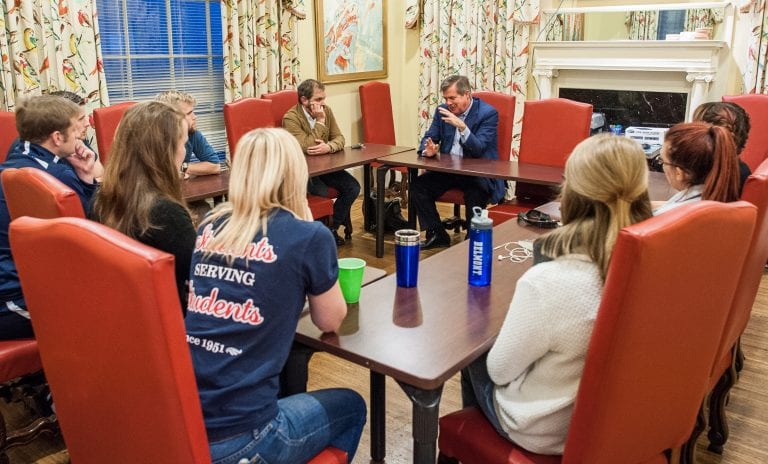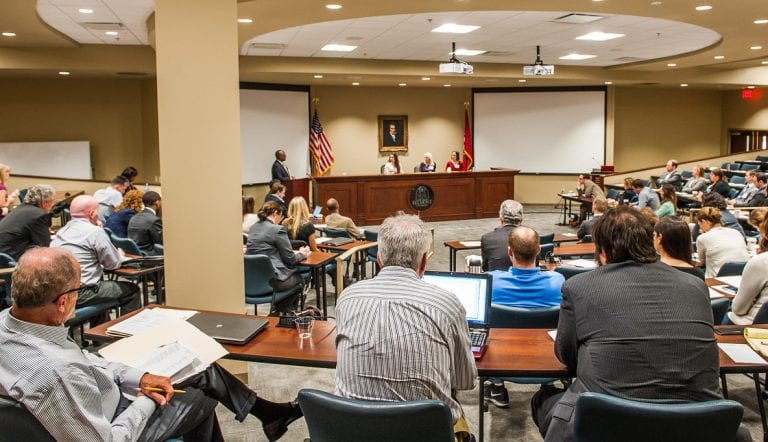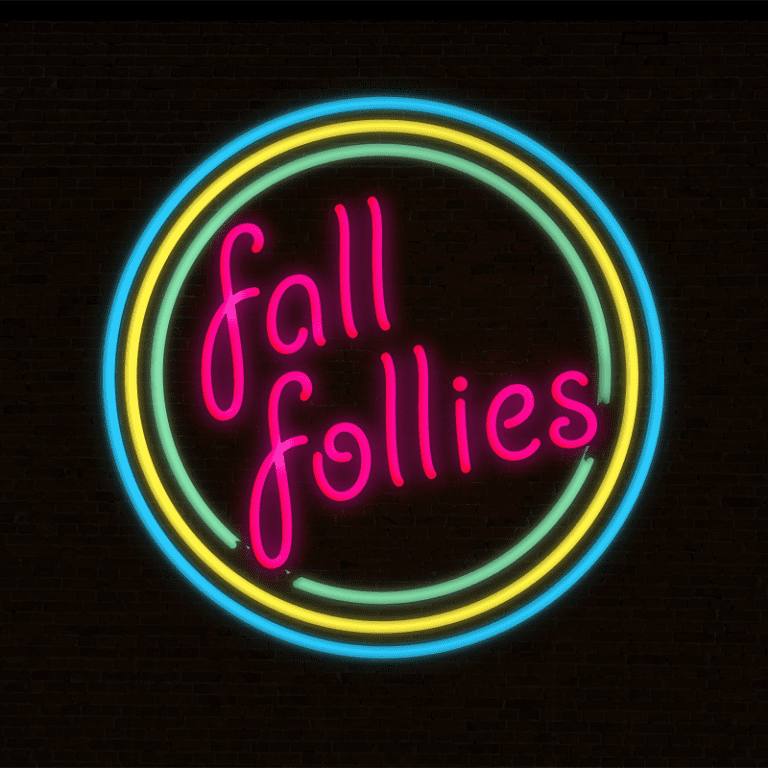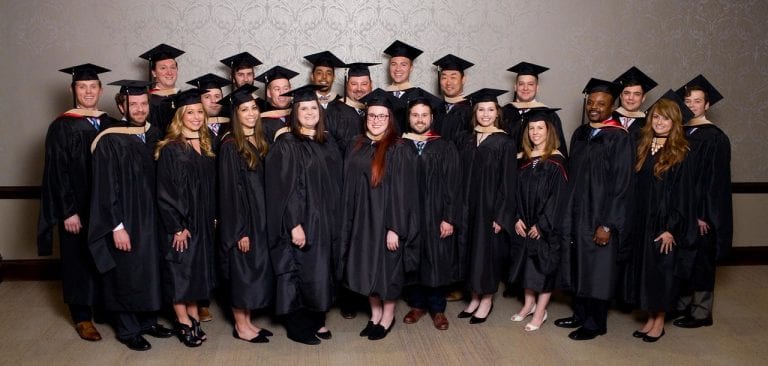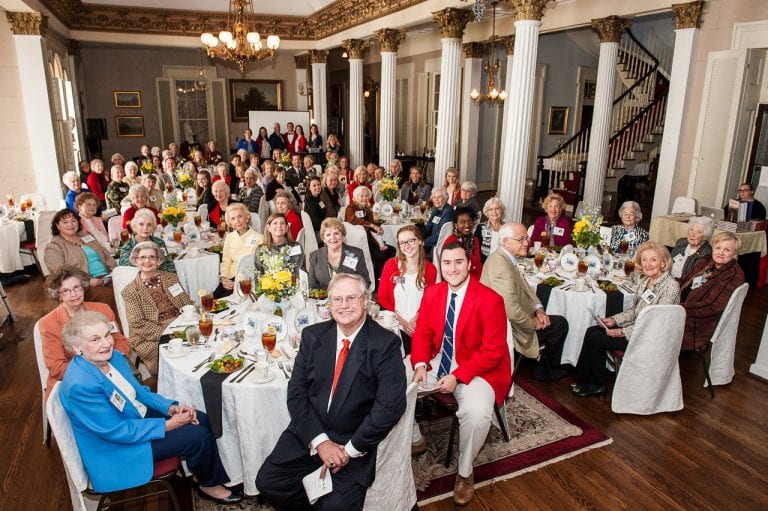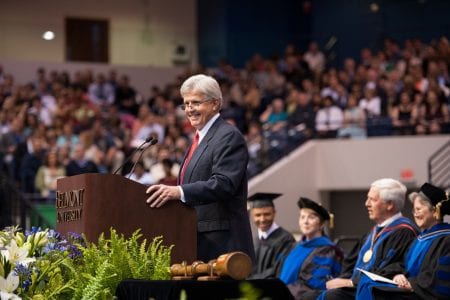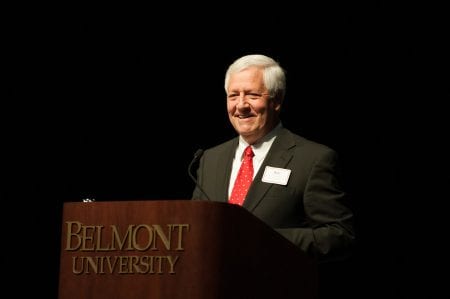Former Nashville Mayor and current Belmont Distinguished Visiting Professor of History and Politics Karl Dean joined an Honors 3400 course—“Leadership and Advocacy”—and spent nearly 90 minutes interacting with students and faculty member Micah Weedman. In addition to answering student questions (“what was the best thing about being Mayor?”), Dean talked about the relationship between leadership and social, cultural and political change, recalling stories of his own time in office. He recounted the evolution in the City’s position on LGBT rights, the fight for AMP and increased mass transit, and defeating the “English only” ordinance by building a coalition of partners across the city. He shared his optimism for Nashville’s future and encouraged each student to consider a career in leadership and politics.
Belmont Celebrates 125 Years through Narrative, Invites StoryCorps to Campus
In honor of its 125th anniversary, Belmont University has dedicated the 2015-16 school year to a campus and community-wide celebration of the institution’s “belief in something greater.” With a year-long birthday party planned, the celebration features many events including an invitation to bring StoryCorps to campus, America’s “oral history project” aimed at capturing some of the country’s most powerful stories.
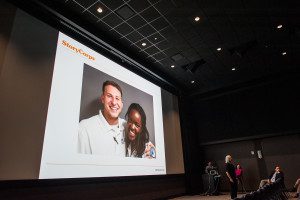 When the initial ideas for Belmont’s 125th anniversary were created, faculty and staff were invited to consider ways to incorporate the celebration into the academic year. Senior Director of University Marketing and Public Relations and 125 Committee Chair John Carney said it was those conversations that laid the groundwork for the University’s year-long programming. As discussions occurred surrounding ways to best celebrate such a significant milestone, Carney said it became more and more clear that the stories of those who contributed to the University’s success should be central to the celebration of its legacy.
When the initial ideas for Belmont’s 125th anniversary were created, faculty and staff were invited to consider ways to incorporate the celebration into the academic year. Senior Director of University Marketing and Public Relations and 125 Committee Chair John Carney said it was those conversations that laid the groundwork for the University’s year-long programming. As discussions occurred surrounding ways to best celebrate such a significant milestone, Carney said it became more and more clear that the stories of those who contributed to the University’s success should be central to the celebration of its legacy.
“Capturing the real stories from Belmont’s past and present would paint the best picture of this institution’s heritage,” Carney said. “And hearing those stories from the mouths of people who experienced them firsthand was the most genuine way to convey them.”
When creating her 125 celebration proposal, Associate Provost of Assessment and Institutional Research Tracy Rokas said she was struck with the idea of narrative and its centrality to the formation of identity. As a member of the University’s Provost Office, Rokas said her team was looking for innovative ways to infuse campus-wide curriculum with opportunities for students to explore their own compelling narratives. When considering the fit for the 125th celebration and a curriculum emphasis on narrative, Rokas said StoryCorps was a perfect fit.
For Carney and the 125 Committee, the idea was an immediate hit. “From the moment Tracy suggested StoryCorps, we knew it had to be a part of the celebration plan,” Carney said.
After spending three days on campus in August, the StoryCorps team completed 17 interviews with 34 people from the greater Belmont community including current students, alumni, faculty, staff, trustees, friends and donors. Sitting in groups of two, members of the Belmont family told their stories – the Belmont story – detailing the rich history of an institution that endured significant challenges to become the University known today.
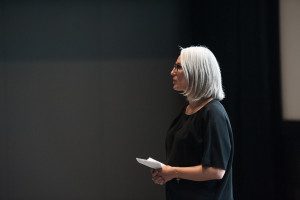 To debut the StoryCorps compilations, two interviews with alumni and current students were showcased at a convocation held on Wed., Oct. 21 where StoryCorps’s Eve Claxton discussed the power of capturing history through story. During her presentation, Claxton described the neuroscience behind storytelling versus information processing. When a story is involved, Claxton said the brain processes the information as if the experience actually happened to the listener, a process called neurocoupling. When information processing includes a vivid story, “their stories become your memories,” Claxton said.
To debut the StoryCorps compilations, two interviews with alumni and current students were showcased at a convocation held on Wed., Oct. 21 where StoryCorps’s Eve Claxton discussed the power of capturing history through story. During her presentation, Claxton described the neuroscience behind storytelling versus information processing. When a story is involved, Claxton said the brain processes the information as if the experience actually happened to the listener, a process called neurocoupling. When information processing includes a vivid story, “their stories become your memories,” Claxton said.
In a discussion detailing their time on campus as Ward-Belmont students, Mary Niederhauser and Laddie Neil told stories of earlier Belmont days where ladies were required to dress in their finest to go into town, needed written permission before leaving campus for a date and looked forward to “t-dances” where they could perform the jitterbug. As they reminisced, Niederhauser discussed the common love shared for Ward-Belmont and its community. “Every day was special – we celebrated everything in a royal way,” Niederhauser said. “I couldn’t be more proud of the college I went to than this one.”
Current students Mikaela Clark and Zach Middleton shared similar sentiments in their discussion of the Belmont they celebrate today. Though different in size and footprint, its heart has remained remarkably similar to the one described by Niederhauser and her Ward Belmont sister, Neil.
After visiting Belmont in high school, Middleton said he was struck with its friendly atmosphere and community feel – an aspect of the University that Middleton said contributed to his interest. “The biggest thing I’ve learned is that I’m comfortable with who I am in my own skin. I’ve never felt that until I came [to Belmont].”
The recipient of a Hearst Scholarship, Clark said she is incredibly grateful for the opportunity to earn a Belmont education and become part of the larger Belmont story, something that she knows will continue on far beyond her four years. “There are people that have been a part of the story of Belmont for decades and have bled into what it has now become. They have created the foundation for this,” Clark said. “And one day we’re going to be someone’s legacy – that’s what I don’t want to change about Belmont. I want every student who comes here to feel like the two feet they place on this ground make a difference and they have imprinted themselves into this University.”
As the University’s 125th anniversary celebration continues on, the remaining 15 StoryCorps interviews will be released to chronicle Belmont’s “belief in something greater” through the power of story, a medium Claxton encouraged attendees to unharness and use daily. “We need to hear your voice – strong, passionate, compelling voices like yours,” Claxton said. “When you do speak out, go into your tool box and pull out your stories. When we share these stories, we make connections, open doors and bridge divides.”
To access Belmont’s 125th stories, visit the anniversary website or download “Stories of Belmont” from the iTunes store. To chronicle your own 125 story and contribute to Belmont’s celebration, click here.
Alumnus’s Band Restless Heart Enters Oklahoma Music Hall of Fame
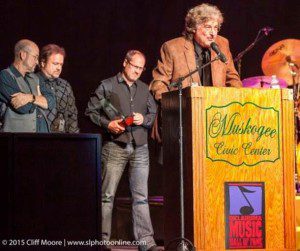 Music Business alumnus Larry Stewart, Class of 1983 and lead vocalist and guitarist of the band Restless Heart, was able to look on as his band was formally inducted into the Oklahoma Music Hall of Fame on Oct. 16. The band personally accepted the honor and performed at the event.
Music Business alumnus Larry Stewart, Class of 1983 and lead vocalist and guitarist of the band Restless Heart, was able to look on as his band was formally inducted into the Oklahoma Music Hall of Fame on Oct. 16. The band personally accepted the honor and performed at the event.
This year’s inductees also included Tim DuBois, who wrote hits like “The Bluest Eyes in Texas” and helped put the band together, and Scott Hendricks, who produced the band’s music in the 1980s.
Law Review Hosts Third Annual Symposium
On Fri., Oct. 16 Belmont Law Review hosted its third annual symposium, titled Entertainment Law and Music Business in Transition. The Law Review was pleased to welcome members of the Nashville legal community, including many entertainment law practitioners, to discuss the challenges posed to current copyright doctrine by the fundamental changes in recent years to the way entertainment is created, distributed and consumed.
The 2015 Symposium included presentations by Professors Brian Frye (University of Kentucky), Michael Epstein (Southwestern Law School), Yolanda King (Northern Illinois University College of Law), Mark Shultz (Southern Illinois University School of Law) and Belmont Law’s own Loren Mulraine, each of whom will be published in the forthcoming Belmont Law Review Volume 3. In addition, the event featured a keynote address delivered by U.S. Representative Marsha Blackburn, a discussion with Bart Herbison (the executive director of the Nashville Songwriters Association International) and a panel discussion around the impact of the recent Williams v. Bridgeport Music Inc. verdict, featuring local practitioners Sara Ellis, Ramona DeSalvo and Suzanne Kessler. Transcripts of these presentations will also be included in the upcoming journal.
Fall Follies 2015 Premieres October 23-24
The SNL-like, parody show Fall Follies is back this year with new sketches, videos and a talented cast of student actors and writers. The shows will run Friday, October 23 at 7:30 p.m. and Saturday, October 24 at 2 p.m. and again at 7:30 p.m. in the Massey Performing Arts Center.
The Follies crew has been constantly working on material since the fall of 2014 and adding the final cuts to the show since August. To get a better idea of this year’s cast, senior writer Rob Knepper and senior cast member Ross Collier answered a few questions.
Rob Knepper:
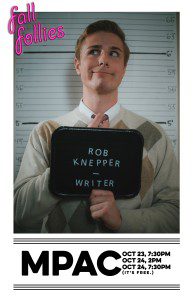 What was your goal in writing the sketches this year?
What was your goal in writing the sketches this year?
I like to aim to have the skit be so ridiculous and confusing in its humor that the audience doesn’t have a single second to slow down and realize what they’re laughing at. That way you can get away with a lot more one liners and such that might not work in a slower skit. Some have referred to my writing as a “fever dream,” which I take great pride in.
How are the sketches different from years past?
Historically, Fall Follies was more of a school-spirit pep rally type of thing. It then transformed into a satire of school-culture, which was a well that seemed to dry up pretty quickly. But last year especially, it seems that Follies took a big turn towards broader (and hopefully more clever/original) topics and forms of comedy, thanks to the vision of Ike Flitcraft. This year continues in that vein, and I think we’ve done a pretty terrific job of making our jokes not dependent on the audience “getting” Belmont culture and grievances. That’s more exciting for us as writers, too, because we’re now writing skits that still make sense completely out of the Belmont stratosphere.
What do you want the audience to know going in? What do you hope they’ll take away?
As long as people don’t come in expecting it to be the Follies of the past that basically stuck to the “caf sucks! Practice hours are oppressive!” mantra, I think they’ll really enjoy it. Comedy shows should be a place for giggles, not resentment. Sometimes it seems like satire is trying to start beef, but I’d argue that satire is instead a positive interpretation of reality.
What content, ideas, campus themes did you draw from?
We’ll be hitting on some good topics relevant to the past semester, mixed in with lots of unexpected themes that are pretty great, too. For the Belmont-specific jokes, expect topics like SGA, parking, 125th anniversary and fancy coffee shop names. We tried sticking to skits that were set in easy to establish environments, so the premise didn’t need to be communicated as much.
Ross Collier:
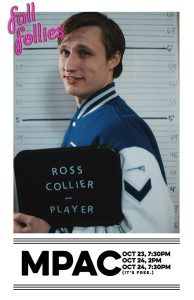 Describe your role in Fall Follies.
Describe your role in Fall Follies.
My role in Follies is the senior advisor — yeah, I’ve been around the block a few times. More so than the new folks — the ol’ youngsters. I’m an old guy — they all know me from being their RA, or from moving them in on move-in day. So they respect me. My role is typically giving some of these young hoots some sagely wisdom, playing some of the supporting roles in the show, and — may I humbly mention — doing some of the graphic design for the show. We re-made the logo this year; I call the aesthetic “classy grunge.”
What scene are you most looking forward to?
I’m most looking forward to a “sketch” (I can’t reveal the name yet) that may “involve” a “song.” One you may have heard before — let’s just say if you’ve been to “whole foods” you might get a kick out of it. Look for it at the end of Act I!
What is the group like this year?
I think that this year, the group is a whole lot tamer. It used to be a rowdy group — staying up late on Friday nights, Tarantino movies, caffeine past 9 p.m. — the whole nine yards. I think we’ve changed. Since last year, we have continued to move towards a bit of a friendlier show. Instead of criticizing folks and harping on negativity, we try to dig into content that is born out of a more positive place.
Who is your biggest celebrity influence?
Sylvester Stallone. Rocky IV is a masterpiece. “He is like a piece of iron” — I mean, who else could write something like that?
How does it feel to be the most hilarious man on campus?
It’s great. Really great — but believe you me, the high is short lived. It gets scary real quick. You walk into the Beaman, and everyone drops quiet — you can hear a pin drop. Then, all at once, they start laughing, and laughing… Uncontrollably… Unending… Just laughter from the roof to the floor. I can’t talk to anyone — they just sit and laugh and laugh. You think you’d want that fame until you realize how deafening that solitude becomes.
Fan the Fall Follies Facebook Page and Event, and follow the show’s Twitter account to see the latest updates and promos.
Belmont’s Part-Time MBA Ranked No. 28 in the U.S. by Bloomberg Businessweek
Massey School’s Professional MBA program garners national acclaim
Bloomberg Businessweek announced today its 2015 MBA rankings with Belmont University landing for the first time in the top 30 nationally among part-time MBA programs. At No. 28, the Massey Graduate School of Business’ part-time MBA program catapulted over its last ranking of 59 in 2013. The Massey part-time MBA landed just behind such notables as Ohio State (No. 19), TCU (No. 26) and the University of Maryland (No. 27). Other notable southeastern region U.S. schools included Emory (8), Rollins (16), Florida (29) and Georgia (39).
Nationally, Northwestern was ranked No. 1, while Carnegie Mellon, Rice, Georgetown and UCLA rounded out the top five. Bloomberg BusinessWeek began ranking part-time MBA programs in 2007 in an effort to recognize the best MBA programs designed specifically for working professionals. Belmont first made the prestigious list in 2009, and has since appeared in each ranking of part-time programs.
“The student and alumni satisfaction rankings indicate that our Massey professors and staff are doing an outstanding job in delivering a high-quality MBA program,” said Dr. J. Patrick Raines, dean of Belmont’s College of Business. “And to be ranked as a Top 30 MBA program in the company of this group of national peers is simply tremendous.”
Massey School Associate Dean Dr. Joe Alexander added, “Furthermore, given our alumni ranked us among the top 6 nationally, the results help demonstrate that our high-quality and applied curriculum prepares our graduates very well for succeeding in a very competitive marketplace. And we think our newest MBA concentrations in business intelligence and international business will soon pay similar dividends for our current students who will graduate with those programs.”
BusinessWeek uses a highly comprehensive methodology for its rankings calculations that includes measures of student satisfaction, academic quality and post-graduation outcomes. Part-Time MBA Rankings are composed of 50 percent Student Survey score (judging campus climate, effectiveness of career services and responsiveness of faculty) and 50 percent Alumni Survey score (MBA feedback, alumni compensation change over time and job satisfaction). Student Survey and Alumni Survey scores were standardized using mean and standard deviation and combined to create final rankings. BusinessWeek’s complete rankings of the “Best Part-Time MBA Programs” is available online and includes the full rankings methodology.
About The Jack C. Massey Graduate School of Business
The Jack C. Massey Graduate School of Business offers high-quality graduate business programs designed for working and aspiring professionals looking to advance or switch careers. The curriculum is designed to provide challenging, yet practical content in a flexible format. Programs are designed to stimulate critical thinking and creative problem solving while encouraging strong communication skills and a solid framework for ethical business decision-making. In addition to core coverage in business administration and accounting, the curriculum is uniquely structured around the themes of entrepreneurship and ethical decision-making across the global economy. All students complete a brief international study-abroad experience as part of their studies. For more information, go to: www.belmont.edu/massey.
Ward-Belmont College Alumnae Celebrate Annual Reunion
The annual Ward-Belmont College Alumnae Reunion was held last weekend as dozens of graduates gathered Oct. 17 in the Belmont Mansion to relive their glory days at the well-respected school and to take part in Belmont’s 125th anniversary celebration.
In 1913, Ward Seminary (a school for girls then located in downtown Nashville) and Belmont College (a school for girls that started in 1890 on the site of Belmont’s campus after the death of Adelicia Acklen) merged to form a new school called Ward-Belmont. It was primarily a boarding school for young women seeking a two-year college degree, but over the years also included a boarding and day school for high school girls, a grammar school and a music conservatory.
Often, the college girls went on to Vanderbilt or other major universities for their last two years of higher education. Ward-Belmont was the first junior college in the South to receive accreditation from the Southern Association of Colleges and Schools. In the spring of 1951, after several years of financial problems, the board of trustees decided to sell Ward-Belmont to the Tennessee Baptist Convention, and in the fall of 1951, the new Belmont College had its first co-educational freshman class.
Many prominent women from the era attended Ward-Belmont, including Sarah ‘Ophie’ Cannon (better known as Minnie Pearl), actress and singer Mary Martin, Clare Booth Luce (founder of Vogue magazine) and Lila Acheson Wallace who, with her husband, founded Reader’s Digest.
Tough Recognized on Recording Excellence Outstanding Professors List
 Associate Professor of Audio Engineering Technology David Tough was featured in Recording Excellence’s “15 Outstanding Professors Every Audio Enthusiast Should Know.”
Associate Professor of Audio Engineering Technology David Tough was featured in Recording Excellence’s “15 Outstanding Professors Every Audio Enthusiast Should Know.”
The list says, “David Tough is a songwriter and producer/engineer based in Nashville, who also teaches at Belmont University. He produces and engineers demos and master recordings for hundreds of artists around the world through his website. His passion for teaching recording technology began in 2002 to ‘help students navigate through the DAW revolution that is still upon us.’ He lists his specialties as audio education, music production, songwriting and creative arts leadership.”
Fisher, Dickens Listed On NBJ’s Nashville’s Most Powerful List
In the Nashville Business Journal’s second listing of the 2015 Power 100 List, the “inaugural rundown of the most powerful people in Nashville business,” Belmont President Dr. Bob Fisher and Chairman of the Board Marty Dickens were recognized. The names are presented in random order, in groups of 25, and the complete list will be published in the November 13 print edition.
Detailed descriptions of the mens’ success can be found on their slideshow profiles.
Seven Curb College Students Attend Five-Day Intensive Songwriting Boot Camp
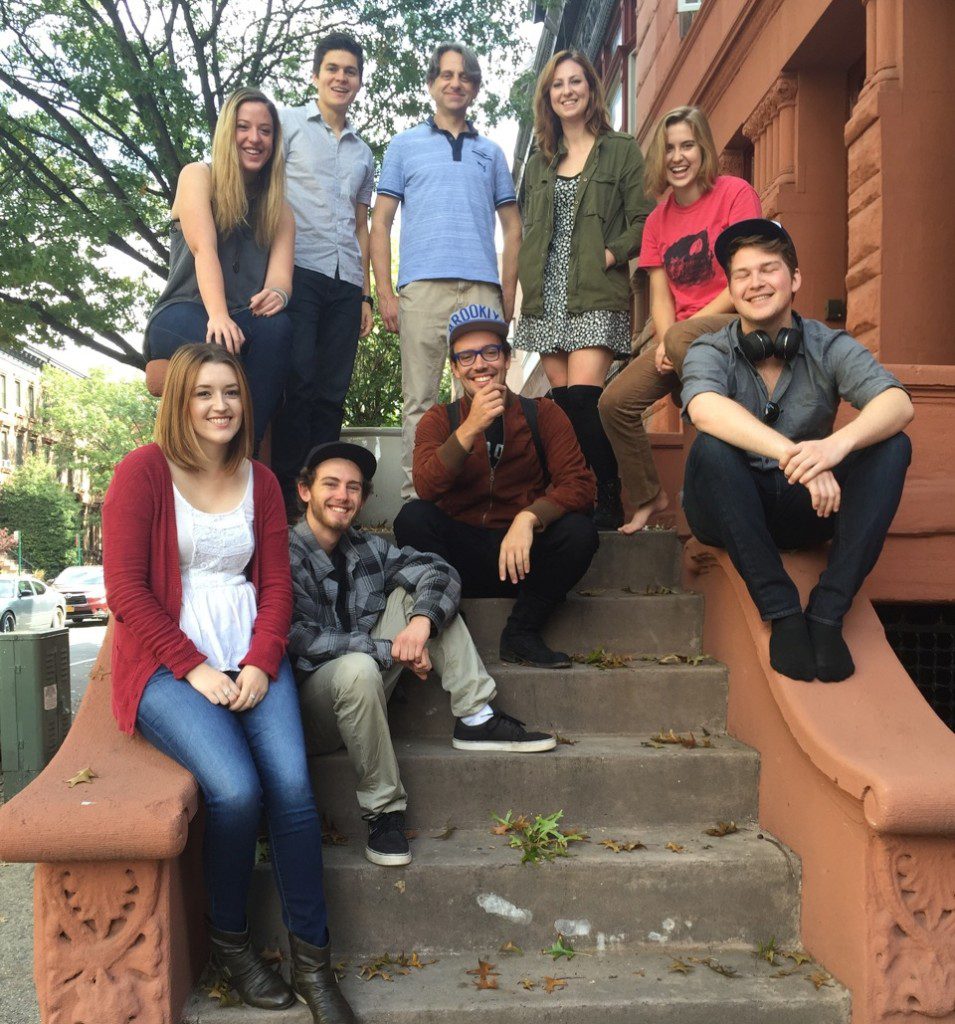 Seven Belmont songwriting majors recently participated in a five-day songwriting boot camp in New York City as part of a partnership between the Curb College of Entertainment and Music Business and Communion Music Publishing. Hosted by Communion in partnership with The Patch in Brooklyn (a program created by Mondelēz International candy brand Sour Patch Kids), the students spent five days with this year’s mentor Ben Lovett, co-founder of Communion Music and Mumford & Sons with a history of writing and collaborating with a wide range of artists. Through the program students were given the opportunity to get hands-on experience with different aspects of songwriting in a variety of sessions ranging from writing for advertising briefs, group sessions and one-on-one coaching.
Seven Belmont songwriting majors recently participated in a five-day songwriting boot camp in New York City as part of a partnership between the Curb College of Entertainment and Music Business and Communion Music Publishing. Hosted by Communion in partnership with The Patch in Brooklyn (a program created by Mondelēz International candy brand Sour Patch Kids), the students spent five days with this year’s mentor Ben Lovett, co-founder of Communion Music and Mumford & Sons with a history of writing and collaborating with a wide range of artists. Through the program students were given the opportunity to get hands-on experience with different aspects of songwriting in a variety of sessions ranging from writing for advertising briefs, group sessions and one-on-one coaching.
The seven juniors and seniors selected to attend the boot camp were Blake Mankin, Katie Dayton, Cici Ward, Jason Earley, Becca Naber, Julianna Zachariou and Will Stone. Emily Bines, a 2008 Belmont graduate, now works at Communion Music in publishing and licensing and helped organize the experience for the Belmont students. Songwriting instructor Drew Ramsey, who accompanied the students on the trip, said, “Emily and her crew at Communion Music arranged a first-class-all-the-way experience for our students.”
The Patch–an initiative that seeks to give musicians a place to live and be inspired while on tour–was a huge hit with the students who commented on how the creative space fed their writing inspiration. Moreover, the students were able to learn and receive demo feedback from industry experts like Lovett as well as singer/songwriter Toby Lightman, American Authors lead guitarist James Adam Shelley and producer Swagg, as well as representatives from SESAC and Kobalt Music.
Naber, a senior songwriting major from Lebanon, Ohio, said, “It’s hard to say which is the best part of the experience because everything was almost like a dream. The Patch was beautiful! Every room was decorated differently and the whole place had a very trendy, Urban Outfitters sort of vibe. This made it a great space to be creative. While the house and the perks were top notch, I have to say getting to spend time talking to the mentors was my ultimate favorite thing. I have gone to plenty of convo seminars to listen to people in the industry that work closely with prestigious artists, but to be sitting on a couch next to Ben Lovett throwing out ideas for a song, that’s going to stick with me.”
Earley, a junior from Sharps Chapel, Tennessee, added, “The best part of this trip was the opportunity to write and record alongside some of the music industry’s most successful and influential figures. They were very encouraging and insightful and offered new ideas. Their process of songwriting showed us what it takes to stand out as a professional in this industry. Ben Lovett shared a songwriting practice that Mumford and Sons uses where they play a game sometimes where you write 20 songs in one day, allowing 30 minutes of writing time per song. This is helpful because it is like a detox for your mind. It gets the brain working, flushing out bad ideas, and ushering in new ideas. I’m going to use this practice!”


